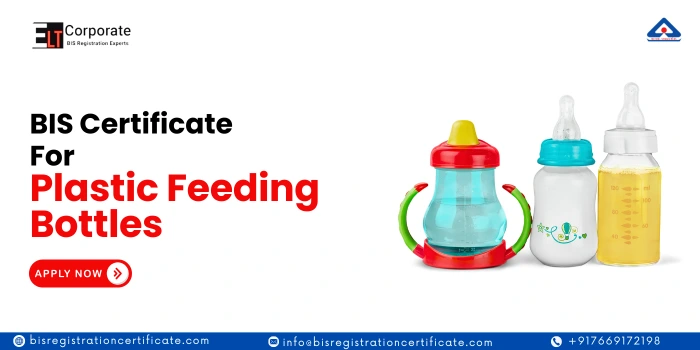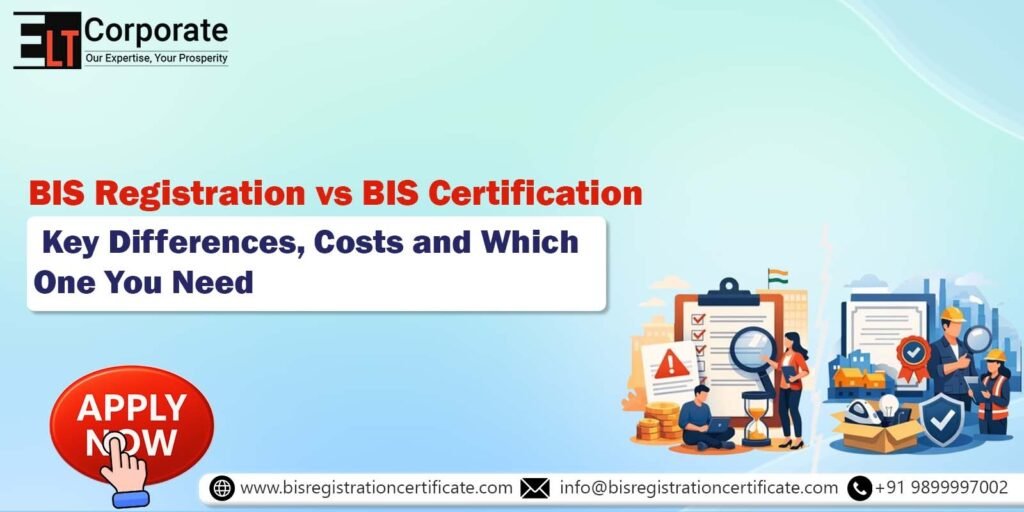Welcome to our in-depth guide on obtaining BIS Certification for Plastic Feeding Bottles with the ISI Mark IS 14625. This certification is crucial for manufacturers dedicated to meeting India’s stringent safety and quality standards for plastic feeding bottles.
The BIS certificate sets a benchmark, ensuring that products comply with national standards and prioritise infant safety. It is also essential for maintaining product integrity and building consumer trust.
For manufacturers, adhering to IS 14625:2015 means demonstrating a commitment to quality and safety, which enhances consumer trust and market credibility. In this guide, we will explore the importance of the BIS Certificate for Plastic Feeding Bottles, the process of obtaining it, and its impact on both manufacturers and consumers. Let’s get started.
What Is The Bureau Of Indian Standards?
The Bureau of Indian Standards (BIS) is India’s national standards body responsible for regulating and promoting product standards across the country. BIS operates eight central laboratories, four regional labs, and three branch laboratories that test product samples during both preliminary and surveillance processes.
While BIS certification is often voluntary, the government encourages its adoption to achieve several key objectives:
- Safeguarding public health.
- Protecting consumers from hazardous products.
- Ensuring quality assurance for customers.
- Building consumer trust and confidence.
Overview Of IS 14625:2015 Plastic Feeding Bottles
The IS 14625:2015 standard provides detailed guidelines for the design, material selection, and testing of plastic feeding bottles. It focuses on using food-grade materials that are free from harmful chemicals, including BPA and other toxic substances.
The standard ensures that the bottles undergo rigorous testing to verify their durability, leak-proof performance, and ability to withstand high temperatures. Additionally, it requires clear labelling, including capacity markings and instructions for safe use.
By complying with IS 14625:2015, manufacturers ensure that their feeding bottles are safe for infants and suitable for repeated use, providing both safety and peace of mind for parents and caregivers.
Key Components Of BIS Certification For Plastic Feeding Bottles [IS 14625]
The BIS certificate for plastic feeding bottles under IS 14625:2015 ensures that these products meet the highest standards of safety, quality, and reliability. Below are the key components that are crucial for obtaining and maintaining BIS certification:
1. Product Scope
- Title: Plastics Feeding Bottles
- Material: Polypropylene (PP), Polyethersulfone (PES), or any other olefin-based polymer/co-polymer as per Annex-A of IS 14625:2015.
2. Sampling Guidelines
- Raw Materials: Each consignment should be accompanied by test certificates.
- Teats: If using ISI-marked teats, manufacturers must provide a consent letter from a BIS-licensed supplier.
- Printing Inks: Suppliers must declare compliance with IS 15495.
3. Grouping Guidelines
- Manufacturers must declare the type of materials and submit samples for testing.
- All sizes and wall thicknesses of the bottles should be declared for scope inclusion.
4. Testing and Inspection
- Daily Tests: Include wall thickness, capacity, transparency, leakage, drop test, and compressive deformation resistance.
- Test Equipment: Annexe-B of the manual provides a detailed list of required test equipment.
5. Scheme of Inspection and Testing
- A maintained laboratory is essential for carrying out tests.
- Test records must be maintained for conformity.
- Marking and packing should comply with the Indian Standards.
6. Performance and Safety Tests
Several critical tests ensure the product’s performance and safety:
- Environmental Stress-Crack Resistance
- Transparency
- Leakage Test
- Drop Test
- Ageing Resistance
- Compressive Deformation Resistance
Documents Required To Obtain BIS ISI Certificate For Plastic Feeding Bottles IS 14625
To obtain BIS certification for plastic feeding bottles, the following documents are necessary:
- Name & Address proof of the applicant and factory premises
- Proof of establishment
- SSI or MSME Certificate
- Information on outsourcing manufacturing procedures
- Factory layout plan
- Factory location map
- Manufacturing process flow chart
- List of machinery involved
- List of testing equipment & facilities
- Calibration certificates for testing equipment
- Third-party laboratory test report as per Indian Standards
- Authorization letter (if signed by an authorized signatory)
- Indian Agent & Nomination Form (for foreign manufacturers)
- Technical information of products (PCB layout, schematic diagrams, user manual, critical components list)
- Acknowledgment receipt
- Consent letter from the CEO
- Undertaking & affidavit with ID proof and signature (for foreign manufacturers)
- Original test reports from a BIS-authorized laboratory
- Test report undertaking
Process To Obtain BIS Certificate For Plastic Feeding Bottle
Follow the steps mentioned below to get BIS certification for plastic feeding bottle.
Licensing Process:
- Fill Out the Application: First, you need to complete the application form provided by BIS. Make sure you have all your documents ready to go!
- Submit the Application: Once everything is filled out, you’ll send your application along with the required documents to BIS.
- Factory Visit: After BIS receives your application, an officer will visit your factory to inspect your setup and processes and ensure everything is in order.
- Sample Testing: During the visit, the officer will collect samples of your product. These samples will be sent to a BIS-approved lab for testing.
- Final Test Report: After all the inspections and tests are completed, the BIS officer will prepare a final report. If your products meet all the standards, you’ll be on your way to certification!
- Certification Approval: Once everything is reviewed and approved, BIS will issue your ISI certification. Congrats!
Surveillance Process:
- Follow-Up Visits: Even after you’re certified, BIS will conduct follow-up visits to make sure you’re still in compliance.
- More Testing: During these visits, they’ll take more samples to confirm that your products continue to meet the standards.
- Feedback: The lab will provide feedback on these samples, and BIS will review everything to ensure you’re still up to par.
- Performance Review: BIS will then prepare a performance review report based on their findings.
- Final Certification: Once everything checks out, BIS will continue your certification, and you’ll be good to go.
Validity Of BIS ISI Certification For Plastic Feeding Bottles
The BIS ISI certification issued by the Bureau of Indian Standards (BIS) is initially valid for two years. Manufacturers can renew the certification if there are no changes to the product or the applicable standards.
The renewed certification can be valid for a period ranging from one to five years, depending on the manufacturer’s preference. To renew the certification, an annual advance minimum license fee and a marking fee must be paid.
Conclusion
Achieving BIS certification for plastic feeding bottles as per IS 14625:2015 assures compliance with regulatory standards and enhances consumer trust. Manufacturers must adhere to the outlined guidelines and maintain rigorous testing protocols to ensure product quality and safety.
Why Is BIS Certification Mandatory For Plastic Feeding Bottles Under IS 14625:2015?
BIS certification ensures that plastic feeding bottles adhere to strict safety and quality standards. It protects infants from exposure to harmful substances and ensures that the bottles are durable, leak-proof, and safe for feeding.
What Materials Are Permitted For Manufacturing Feeding Bottles Under IS 14625?
IS 14625 requires the use of food-grade plastics that are free from harmful chemicals such as BPA and other toxins. The materials must also be able to withstand high temperatures and be suitable for repeated sterilization processes.
What Are The Key Tests Performed To Ensure Compliance With IS 14625:2015?
Compliance testing includes checks for chemical safety (ensuring no harmful substances are present), physical properties (such as leak-proof design and capacity accuracy), and thermal resistance to confirm the bottles’ safety and durability for infant use.
How Long Does It Take To Obtain BIS Certification For Plastic Feeding Bottles?
The BIS certificate for plastic feeding bottle processing usually takes around 30 days for Indian manufacturers and up to 180 days for foreign manufacturers.









